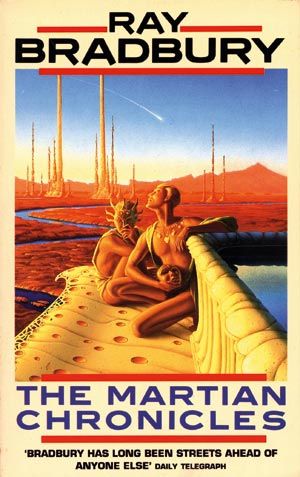
It is with heavy heart that we have to announce the passing of one of science fiction’s true giants – author Ray Bradbury.
He died yesterday evening, aged 91, in Los Angeles.
Ray wrote a staggeringly long list of classic sci-fi and fantasy novels and short stories, but he will be best remembered for The Martian Chronicles and Fahrenheit 451 . Even if he had never written anything else, those two titles would have secured him a place in the SF Hall Of Fame. And Something Wicked This Way Comes ensured his membership of the Fantasy Hal Of Fame Next door.
We raise of glass of dandelion wine to you.
As a tribute, we’re posting the following interview with Ray (by Joseph McCabe) from SFX #138, back in 2005. If nothing else, make sure you read the final paragraph.

More so than perhaps any living writer, Ray Douglas Bradbury is science fiction.
Who else could have created the futuristic worlds of The Martian Chronicles and Fahrenheit 451 ? Or been called “The Poet Laureate of Science Fiction” and “The World’s Greatest Living Science Fiction Writer”? And is there another SF writer who’s received the United States government’s prestigious National Medal of the Arts “for his incomparable contributions to American fiction as one of its great storytellers who, through his explorations of science and space, has illuminated the human condition”?
Sign up to the SFX Newsletter
Get sneak previews, exclusive competitions and details of special events each month!
Yet, ironically, this most legendary of all science fiction scribes is perhaps the least scientific. For Bradbury has always examined the world not in terms of physics or mathematics, but in the language of poetry and metaphor.
“I’m not a scientist, no,” says Bradbury, speaking with SFX from his home office in Los Angeles. “I’m a literary writer. I’m not scientific in any way whatsoever.”
Bradbury claims his literary instincts have instead been fuelled by “…love”.
“The main thing is I grew up in the library. And if you grow up in the library you fall in love and you stay in love for a lifetime. So you develop your talents along the way. When you’re 12 you don’t have much, but if you keep going to the library every day of your life for 30 years you’re bound to improve.”
Bradbury’s first literary influence was Edgar Rice Burroughs, and his first piece of writing a sequel to Burroughs’s John Carter novel The Gods Of Mars .
“Tarzan was the beginning,” he says with enthusiasm. “And then all the Martian books. Then later on Jules Verne and HG Wells. I appreciated the fact that Burroughs’s books were fantastic and not scientific. There was no science there at all. It was all romance.”
We ask Bradbury if it was Burroughs’s work that inspired him to create his own race of Martians in The Martian Chronicles .
“Probably,” he says, “but that’s years later and it’s hard to guess what your influences are. But it began with Burroughs.”
These days, however, Bradbury claims he reads very little science fiction.
In turn, Bradbury has imparted those lessons on generations of readers. He speaks of his belief in mankind’s destiny – its future in space. It’s a belief that prompts some to label him an optimist, a title he rejects.
“I’m not an optimist. I’m an optimal behaviourist, which means: get out of bed every day and do your work and do it well. And at the end of the day you feel good about yourself. That’s the important thing. You’ve got to like yourself, and if you like yourself, you can get your work done.”
With all of the problems the world now faces, does he find it hard to avoid cynicism?
“Why would you be a cynic?” he says. “It’s going on, you can’t do anything about it, so you do what you can. Whatever you’re doing, do it well. If you clean up your part of the world, that’s your responsibility. That’s all you can do. If you become a cynic you don’t do anything.”
Yet Bradbury understands disappointment. He’s seen a handful of his books adapted to film with mixed results, and he doesn’t hide his feelings on the state of contemporary science fiction filmmaking.
“Frank Darabont’s been working on a new Fahrenheit 451 screenplay during the last year. He’s finished the screenplay, but there are no plans for production because there’s no money. So the terrible thing is now he’s gotta go out and try to find financing for his screenplay; and there are 15 other screenplays by 15 other terrible writers. So that’s in abeyance. And at Universal, The Martian Chronicles – they optioned it seven, eight years ago, and there are now 15 screenplays, fof them ive by me, and there are no plans to make the film. They want something trashy and full of special effects, like Van Helsing and The Mummy and The Mummy Returns . All of those are terrible, dreadful films. Dreadful films, but they made money, so the studio thinks that they’re doing things right.”

CGI, he says, has impacted films “…all for the bad. Now we have special effects every five minutes instead of once every half hour. If you look back at the films you really love, you didn’t have that many special effects. Just things that, for a moment, touched you, and you remember them for the rest of your life. The Mummy , made in 1932, didn’t have any special effects, except towards the end of the film for about 30 seconds. But you remember that film 60 years later.”
At 85, Bradbury is a volcano, erupting not only with creativity, but passion and fury. Though a self-proclaimed physical coward (he first travelled by air at 48), he’s quick to take public stands on social and political issues. Most recently, he demanded the release of librarians imprisoned in Cuba.
“When it comes to physical violence or war or that sort of thing I’m a coward, but… For instance, I was called upon during the last two weeks to make a comment on the fact that Castro has been throwing librarians in prison and censoring their books or burning their books. So it didn’t take any courage on my part because I get angry when I hear this sort of thing. I get mad and I speak up. So I’m demanding that Castro release all of his librarians, and hand back the books and stop the burnings. So that makes me brave, in the face of a monster like that. When it comes to things like that, I’m not a coward.”
Like his courage, Bradbury’s writing output remains constant. He says the process of writing has grown no more difficult over the last 65 years, though it has changed.
“It’s changed in the last 15 years or so. I wake up in the morning and I have what I call my ‘morning theatre’ inside my head. I’m not asleep and not fully awake, but the metaphors are jumping around in my head, knocking against each other. They’re colliding and splitting. So I lie in bed and watch my metaphors move around behind my eyeballs. And when they reach a certain point I get out of bed and go write them down. So I look forward every morning to what my subconscious is providing for me when I’m waking up.”
When asked what advice he gives young authors, Bradbury again mentions the driving force behind all of his work – love.
“Fall in love and stay in love,” he says straight away. “Write only what you love. Don’t write what others love. If people try to tell you what to write, tell them to go away, because it’s got to be your work and your love. And if they do that, then they’ll have a good life.”
SFX Magazine is the world's number one sci-fi, fantasy, and horror magazine published by Future PLC. Established in 1995, SFX Magazine prides itself on writing for its fans, welcoming geeks, collectors, and aficionados into its readership for over 25 years. Covering films, TV shows, books, comics, games, merch, and more, SFX Magazine is published every month. If you love it, chances are we do too and you'll find it in SFX.

Devil May Cry producer hopes new Netflix anime inspired by Christopher Nolan’s Batman trilogy will show fans that "the villain of your story is the hero of their own story"

Lazarus review: "Unfortunately Cowboy Bebop director's new sci-fi anime never quite melds into a harmonious whole"











